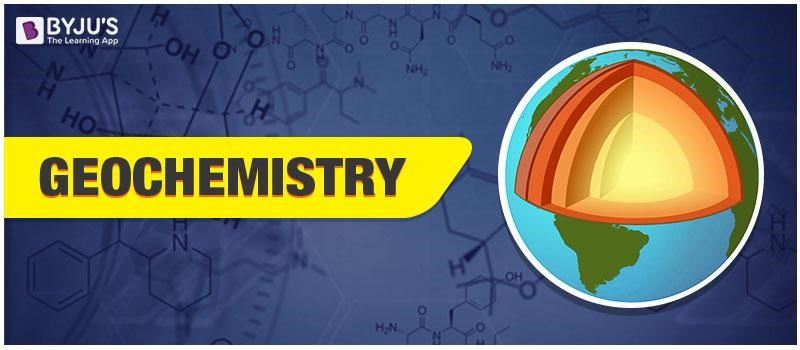What is Geochemistry?
The field of geochemistry studies the distribution and amounts of chemical elements and their behaviour on Earth and on the related planets.
Geochemistry deals with geological processes at the “atomic level” and the history of atoms in the Earth’s crust and on the planet as a whole.
An alternative definition given by Tauson states that geochemistry is a science that studies the chemistry of geological events and the laws of migration, concentration and scattering of chemical element atoms in endo and exogenous environments that manifest themselves on Earth.
Table of Contents
- Recommended Videos
- Subfields of Geochemistry
- Statistical Geochemistry
- Earth’s Mineral Constituent
- Scope of Stable Isotope Geochemistry
- Frequently asked questions
Recommended Videos

Subfields of Geochemistry
Methodologically geochemistry is traditionally divided into the geochemistry of elements, the geochemistry of processes and the geochemistry of systems. Geochemistry of elements studies and describes the behaviour of elements in conditions of various natural or human-caused systems and processes.
The various subfields of Geochemistry are as follows-
- Biogeochemistry
- Organic geochemistry
- Trace & Elemental geochemistry
- Metamorphic & Igneous-rock geochemistry
- Regional Geochemistry
- Photogeochemisty
Statistical Geochemistry
The term Geochemistry is obtained from the etymological term Geo + Chemistry, which means Earth and chemical principles. Thus Geochemistry is that branch of Science that applies chemical principles to understand the Earth system. This principle is used to explain the mechanism behind the major geological systems such as Earth’s crust, oceans, biosphere and climate, rocks, fluids, gases, and biological reactions, that exchange matter and energy over a range of time scale.

Geochemistry integrates the principle of physics, chemistry and biology to study the dynamics and processes of the earth. Furthermore, the study extends beyond the Earth, encompassing the entire Solar system, i.e. in the study of other planets, the origin of granite, the study of the sun etc.
Earth’s Mineral Constituent
Our planet houses about 94 elements which are naturally occurring. These elements are not found in their simple elemental states. They are generally combined with other elements and need to be separated if we wish to use them for any intended purpose.
Most of the substances are present in the form of compounds of oxygen, chlorine, sulphur, and fluorine.
Percentage of the composition of materials on the earth has been found to be:
| Component | Percentage of composition on earth’s crust (%) |
|---|---|
| Si O2 | 59.71 |
| Al2 O3 | 15.41 |
| Fe2 O3 | 2.63 |
| Fe O | 3.52 |
| Mg O | 4.36 |
| Ca O | 4.90 |
| Na2 O | 3.55 |
| K2 O | 2.80 |
| H2 O | 1.52 |
| Ti O2 | 0.60 |
| P2 O5 | 0.22 |
Incorporating the concepts of other sciences like geobiology, geophysics and geology, geochemistry is used to find how different factors of the metamorphic and igneous processes like rates and timings are on the different planets in our solar system.
Scope of Stable Isotope Geochemistry
Traditionally the principal elements of interest in stable geochemistry were H, C, N, O and S. Over the last two decades Li and B have also become “staples” of isotope geochemistry. These elements have several common characteristics.
- They have low atomic mass.
- The relative mass difference between their isotopes is large.
- They form bonds with a high degree of covalent character.
- The elements that exist in more than one oxidation state for a wide variety of compounds are important constituents of naturally occurring solids and fluids.
- The abundance of the rare isotope is sufficiently high generally at least tenths of a per cent to facilitate analysis.
In combination with other sciences, geochemistry contributes to our knowledge of Earth as an extremely complex geosystem, including its origin, structure, evolution and interactions between its constituents. Like any science studying the material world, geochemistry is interdisciplinary; it comprises elements of physics, chemistry and biology and uses tools developed in mathematics, informatics, thermodynamics the theory of systems etc.
Frequently Asked Questions
Who is the father of geochemistry?
Victor Moritz Goldschmidt: Father Of Modern Geochemistry.
What is the geochemistry of the atmosphere?
Atmospheric chemistry is a branch of atmospheric science which studies the chemistry of the atmosphere of the Earth and that of other planets. Types of issues that atmospheric science has tackled include acid rain, ozone depletion, photochemical smog, greenhouse gases and global warming.
What is geochemistry used for?
The composition, structure, processes and other physical aspects of Earth are studied by geochemists. We study the distribution of chemical elements in rocks and minerals, and the absorption of these elements into soil and water systems.
Which of Earth’s spheres do geochemists study?
Geochemists are researching how Earth’s minerals and natural compounds interact with the atmosphere and hydrosphere.
What are the main geochemical cycles?
The concept of a geochemical cycle encompasses geochemical differentiation (i.e., the natural separation and concentration of elements through Earth processes) and heat-assisted, elementary recombination.
To learn more about the different branches of chemistry like forensic chemistry and more, register with BYJU’S.


Comments